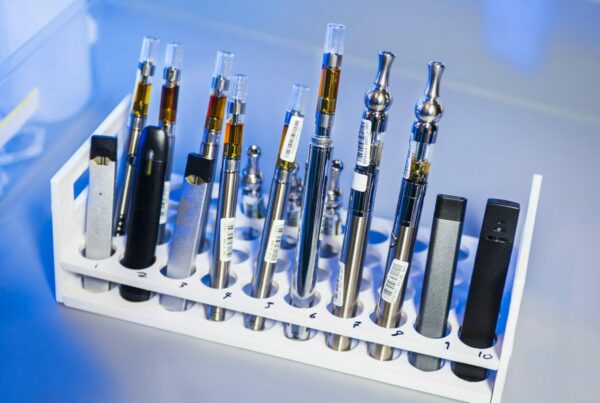N, N-Dimethyltryptamine (DMT) is a naturally occurring compound found in various plants and animals, acclaimed for its intense yet temporary psychedelic effects when ingested.
Emerging research proposes that DMT, produced naturally in the body, plays crucial roles in both the peripheral and central nervous systems, possibly acting as a neurotransmitter.
DMT is known for its strong psychedelic effects, although it generally doesn’t cause many negative side effects, apart from potential cardiovascular problems when administered in high doses via injection.
Let’s explore DMT and its diverse roles, from its recreational use to its promising potential in scientific research and therapeutic uses.

DMT: A Brief Introduction
| Characteristic | Description |
| Name | N, N-Dimethyltryptamine (DMT) |
| Type | Indole alkaloid |
| Occurrence | Found naturally in a variety of plants and animals |
| Psychoactive Effects | Consumption leads to brief, intense psychedelic experiences. |
| Method of Use | Can be smoked, injected, or taken orally. |
| Duration of Effects | Effects are short-lived, typically lasting between 5 to 30 minutes. |
| Chemical Structure | Comprises a tryptamine core with two methyl groups attached to the nitrogen atom of the amine group. |
| Metabolism | Rapidly metabolized by the body, broken down by monoamine oxidase (MAO). |
| Historical Use | Traditionally used in several ceremonial and shamanic rituals across indigenous cultures. |
| Alternative Names | Dimitrifantasia, Businessman’s trip, Businessman’s special, 45-minute psychosis, spiritual molecule |
DMT’s Role in Mental Health
N, N-Dimethyltryptamine (DMT), a compound famous for its powerful psychedelic effects, is gaining attention for its potential implications in mental health. Despite its historical use in triggering profound visionary experiences, recent research suggests a correlation between DMT and mental well-being.
Effects on Psychological and Emotional Well-being
DMT, known for its psychedelic effects, can trigger deep emotional experiences and alter states of consciousness. This could potentially pave the way for innovative therapeutic techniques to address mental health issues, facilitate emotional processing, and provide new perspectives on personal traumas.
The Role of DMT in Neuroplasticity and Brain Function
Research suggests that DMT can influence neuroplasticity, thereby enhancing the brain’s ability to adapt and reorganize. Studying its impact on synaptic plasticity and neural connectivity could lead to potential treatments for conditions associated with neural misalignment.
DMT’s Potential Use in Treating Mental Health Disorders
Early research underscores DMT’s potential in treating disorders such as depression, addiction, and PTSD. Its ability to induce mystical or spiritual experiences could offer a novel approach to psychotherapy and help reshape negative thought patterns.
The study of DMT’s natural presence in the body reveals its significance in promoting mental health resilience, managing stress responses, and maintaining overall psychological wellness. Understanding how the body controls internal DMT levels could lay the foundation for innovative therapeutic interventions.
DMT’s Impact on Mental Health Disorders
| Mental Health Disorder | Description | Effectiveness of DMT | Potential Benefits |
| Depression | A mood disorder that involves persistent sadness, loss of interest, and low motivation | Preliminary studies suggest that DMT might alleviate symptoms by inducing profound emotional experiences. | DMT’s rapid onset and ability to provoke transformative experiences may introduce novel therapeutic techniques for reshaping negative thought patterns and enhancing emotional processing |
| Post-Traumatic Stress Disorder (PTSD) | A mental health disorder triggered by traumatic events, leading to flashbacks, intense anxiety, and intrusive thoughts | Emerging research points to DMT’s potential to manage symptoms by inducing spiritual or mystical experiences, which could help patients reshape traumatic memories | DMT’s ability to induce altered states of consciousness may facilitate emotional processing and provide a fresh perspective on traumatic experiences |
| Addiction | A complex disorder characterized by compulsive engagement in rewarding stimuli, despite adverse consequences | Several studies suggest DMT’s potential role in disrupting addictive patterns and reducing substance cravings | DMT’s capacity to provoke intense and transformative experiences may assist individuals in altering their behavioural patterns and addressing their addictions |
Approaches to Utilizing DMT
DMT, acclaimed for triggering brief yet profound psychedelic experiences, can be administered in several manners. The choice of delivery method often rests on the desired intensity and duration of the trip.
Smoking:
DMT, when smoked in a pipe or vaporized, necessitates meticulous temperature control to avoid overheating and destroying the substance. The psychedelic experience initiated by smoking DMT is almost instantaneous, typically lasting between 5 to 15 minutes.
Oral Consumption:
Taking DMT orally leads to delayed onset effects which endure significantly longer, often for several hours. This is due to the slower metabolization of DMT when paired with an MAOI.
Injection:
DMT can be directly injected into the bloodstream for immediate and potent effects.
This approach results in a rapid and profound experience, but it necessitates precise dosage and carries elevated risks.
Insufflation (Snorting):
Snorting DMT results in a slower onset of effects compared to smoking, however, the experience may last longer.
Sublingual or Buccal Administration:
When absorbed through the lining of the mouth, this method offers an alternative to smoking and delivers a longer, though less intense, experience.
Determining Therapeutic Dosage: N, N-Dimethyltryptamine (DMT)
For smoking, the recommended dosage is between 20 to 40 mg, while for intravenous administration, the suggested dosage is 0.2 to 0.4 mg per kg of body weight. These dosage recommendations are primarily relevant for clinical research, particularly for intravenous administration.
- Higher doses administered intravenously are associated with intense visuals, temporary loss of control, and a mixed state of anxiety and euphoria
- Interestingly, lower doses have demonstrated less favorable effects
- Recreational doses of smoked DMT generally range from 40 to 50 mg, sometimes even escalating up to 100 mg
- Various doses of intravenous Individuals who have used DMT (7, 14, 18, and 20 mg solutions) and encountered near-death experiences have indicated significant and enduring enhancements in their psychological health.
Access to DMT
ProductsOsmosis – 4-ACO-DMT Ethereal Essence Tincture
This tincture is marketed as containing 4-Acetoxy-N, N-dimethyltryptamine (4-AcO-DMT), a form of DMT. Tinctures are liquid extracts designed for oral intake, and this particular item may offer a distinct experience in comparison to regular DMT.
Lucid Supply Co. – 5-MeO DMT Vaporizer
This product is a vaporizer delivering 5-Methoxy-N, N-dimethyltryptamine (5-MeO-DMT). It’s known to produce intense, transformative, and short-term experiences, with 5-MeO-DMT being its active component.
Integral Alchemist – Acacia – 1ml DMT Vape Cartridge
The Integral Alchemist’s DMT vape cartridge is pre-loaded with N, N-Dimethyltryptamine. It is seemingly designed for those who favor a discreet and convenient mode of DMT ingestion.
Deadhead Chemist – 5-Meo-DMT Cartridge
This cartridge houses 5-Methoxy-N, N-dimethyltryptamine (5-MeO-DMT), a compound known for its deep and powerful effects.
Anticipated mental health benefits might be linked to personal growth, spiritual experiences, or therapeutic applications aimed at enhancing emotional well-being.
Deadhead Chemist – N, N DMT Cartridge
A separate offering from Deadhead Chemist, this cartridge contains the traditional N, N-Dimethyltryptamine. Cartridges provide a user-friendly approach to DMT consumption, allowing for a more controlled and consistent experience.
Concluding Remarks
Utilizing N, N-Dimethyltryptamine (DMT) in
How to use DMT effectively for mental health?
It is crucial to make well-informed decisions, which involve thorough research and an understanding of the compound’s effects.
Advice from mental health professionals or seasoned users can give vital perspectives on the potential risks and advantages.
Recognizing personal tolerance and mental preparedness is also paramount, as well as ensuring a nurturing and secure environment for the experience.
How does DMT stack up against other psychedelic treatments such as psilocybin or LSD in mental health therapy?
DMT’s effects, duration, and intensity vary when contrasted with other psychedelics like psilocybin or LSD. It’s noted for its brief duration.
Its unique, high-intensity, short-term effects require distinct therapeutic strategies in mental health, compared to the approaches used for longer-lasting psychedelics.
Recommended Additional Reading:





